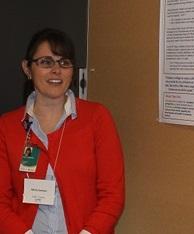 Soon families experiencing homelessness in Cincinnati may be receiving an essential, game-changing resource: childcare. Every family needs good, reliable childcare options to secure and maintain employment, and families experiencing homelessness are no different. However, understanding the high-priority nature of this need required some research. So the LEND team (Leadership Education in Neurodevelopmental and related Disabilities) at Cincinnati Children’s Hospital Medical Center (CCHMC) sat down with caregivers experiencing homelessness to truly understand their perspective and most pressing needs.
Soon families experiencing homelessness in Cincinnati may be receiving an essential, game-changing resource: childcare. Every family needs good, reliable childcare options to secure and maintain employment, and families experiencing homelessness are no different. However, understanding the high-priority nature of this need required some research. So the LEND team (Leadership Education in Neurodevelopmental and related Disabilities) at Cincinnati Children’s Hospital Medical Center (CCHMC) sat down with caregivers experiencing homelessness to truly understand their perspective and most pressing needs.
Fortunately, several agencies were also looking at ways to alleviate problems for families experiencing homelessness in Cincinnati. In response to overwhelming unmet need, local leaders had undertaken efforts to expand Cincinnati family shelter services, since only 30% of families who contacted a Cincinnati housing hotline in 2014 were able to be provided with a space in a shelter. Hence, a Family Homelessness (FH) Studywas underway to help understand which resources and services would be most useful for families in shelters. The study was being led by the Society of St. Vincent de Paul, Strategies to End Homelessness, the Cincinnati Housing Family Partnership, and several other agencies.
“Many people were looking at demographic data, benchmarking efforts in other cities, and interviewing shelter staff as well as community organization leaders. But the FH Study had not yet had a chance to talk with families experiencing homelessness directly to understand their perspective. That’s where I knew LEND could help,†said Dr. Tanya Froehlich, Associate Professor in CCHMC’s Division of Developmental and Behavioral Pediatrics (DDBP).
Dr. Froehlich, along with LEND Trainees Molly Carter (Psychology), Megan McDonald (Speech-Language Pathology), and Molly Sawyer (Family), conducted a needs assessment called a Group Level Assessment with 11 caregivers living in shelters. Participants provided information regarding their child’s medical, developmental, learning, social, and behavioral needs. Seventeen prompt posters were used to collect information during this discussion, with prompts like “My child’s greatest needs are…†and “The concerns I have about my child’s behavior are…â€
Findings from the discussion were summarized in the LEND team’s year-long research project, Developmental, Behavioral and Medical Needs of Homeless Children, and found six major concerns: childcare, transportation, accessible resources, support for children experiencing the emotional trauma of homelessness, support for children to develop their imaginations, and the importance of family strength or faith.
“Our LEND research found that lack of reliable childcare was one of the biggest barriers to securing employment and permanent housing. You might not think childcare was among the families’ most pressing needs, but it’s very difficult to attend a job interview or a housing interview and make a great impression with your children in tow. Unfortunately, families are not eligible for childcare subsidies, and cannot afford childcare, until the caregivers secure employment — so the cycle of joblessness is perpetuated,†said Dr. Froehlich.
The LEND team’s findings were presented to the larger team leading the Cincinnati FH Study. Within a few short months, the LEND team received some encouraging news. “The agencies involved in the FH study heard our recommendation loud and clear that developing a childcare resource for families living in shelters should be a priority. And the agencies have convened a Family Shelter Services work group to make this goal a reality,†said Dr. Froehlich, who is a member of the newly created work group. The team is even looking into incorporating some emotional, medical, and developmental supportive services into this childcare setting, since they are aware that children experiencing homelessness often face challenges such as trauma, lack of basic health care, and developmental delays.
Plans are now underway to deliver a much needed resource to families experiencing homelessness in Cincinnati, all thanks to the most powerful and direct research tool available – the power of conversation. This is just one way that LEND is making a world of difference for Cincinnati families in need.
——–
To learn more about Cincinnati’s efforts to alleviate homelessness, check out The Cincinnati Enquirer’s October 18, 2015 story, “When Nowhere Is Homeâ€, which highlights the Family Homelessness Plan, and specifically mentions the recommendation to provide shelter families with childcare.
